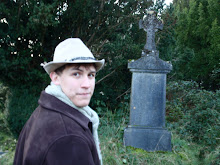C. S. Lewis is capturing my imagination once again literarily, philosophically, and even theologically. With The Great Divorce and The Abolition of Man behind me, I am making way through Screwtape Letters. Upon their completion, it is further up and further in with Problem of Pain, Surprised by Joy (which I have not read), and Out of the Silent Planet. Such works will always hold a special place in my heart, and as I hope to pursue a very interdisciplinary way of life and of teaching, I hope in many respects to imitate such a mind.
The weight of glorious matters hangs heavy on my heart, yes, in part because I am rediscovering a childhood literary hero, but also in light of Advent, and the season that implants the glorious incarnation in the minds of so many (Yes, such a matter should constantly drive those who are a part of the 'New Humanity'; however, the nature of the season as symbol is not to be diminished).
A man of no mean age sits in his wheelchair, in the well-to-do retirement home, listening to children demonstrate various proficiencies at the piano, as they play, in the spirit of the holiday, many a well-known jingle. He hardly speaks, for he barely can. He mumbles, as if to himself, something of passing significance in between songs, yet it does not seem that he is fully aware. It may be that his attention is devoted to the music. He fixes his eyes into space and seems, from my perspective, lost in thought, or simply lost. He hums along in dissonant groans to familiar tunes, but any words are incoherent. Others applaud the children, and to this also he is oblivious.
A young lad, no more than nine, marches dutifully to the piano, and nervously performs a rather broken semblance of the song, "Hark the Harold Angels Sing." The song reaches a welcomed climax to a nearly indistinguishable tune, yet the last melodic chords are seamless. At this, the elderly gentleman, disregarding propriety, clearly intones in full voice, "Hark the Harold Angels sing, Glory to the new-born King!"
I cannot help it: my eyes are averted to the man's countenance. He smiles boyishly, gives a single clap of his hands, and fiddles with his fingers, as if all joy collects before him instantly as dust, so that he might capture and savor it. I saw then a young lad, many years earlier, in the living-room of his household, sitting at the piano in his father's lap while these fingers, enraptured with the joy of learning their first carol, play tentatively, dwarfed by the hands of his teacher. The thought was simple, and not elaborate. How could I know if they were true memories, they certainly were not mine. There may have been a tear in the man's eye, my eyes could not see clearly.
I am not entirely sure what prompted this sudden outburst from the elderly man who did not otherwise speak. I do not particularly care to know for sure, but I venture a guess: Advent draws hearts to hear a wondrous news. The reality of Advent is that, whether consciously or unconsciously, men and women of all ages sing of it every year in these parts. Granted that Victorian, romanticized imagery imbues every song for those who do not grasp their weight. That is why the weight must remain.
It is not merely about keeping Christ in Christmas (As if winter solstice was sacred among all other days). Christ cannot be removed from any realm of this present day, for he reigns, firmly established, and "of the increase of his government and of peace their will be no end." All who are in Christ are established thus, and the principalities and powers shall not prevail. It is ultimately about the reality of all things wrong being made right because of incarnation (ultimately through resurrection). If we lived constantly in light of this, the truest of realities, putting off such frivolous, polar extremes as idolatry and iconoclasm would not so rend the Body.
For we believe that we have died, been buried, and are raised with him who formed the New Humanity. So, we enter into this identity at our baptism, in symbol, but also in truth, as this baptism is nurtured in our lives. We believe also that flesh and blood, having been broken and spilled, were given for the redemption of man, the conformity of many sons to glory. So also, we partake of these, through the elements, in spirit and in truth: in remembrance, yes, but also in reality pertaining to substance.
We live a reality as Christians. It is a mythical reality, filled with types, symbols, forms, and narrative, but history and myth coincide in unison, preparing the way of the Great King, who shall return, in flesh and blood, to rule the 'High Countries' of new creation. Legend will no longer give way to intellectual criticism, but intellect, will, body, soul, and passion shall be transformed fully into the likeness of Christ. Advent must look to all of these things, in symbol and in reality alike.
"All shall be well,
and all shall be well,
and all manner of things shall be well."
~Julian of Norwich
Merry Christmas
two hundred. forty one.
12 years ago
